There are four links to photographs. Three of the photographs are copies of the front page of a Hong Kong newspaper, and the fourth photograph is the typical photograph of the police bringing in a suspect.
Is this libel? From reading the material that "TheOne88" re-posted, this seems to be the standard stuff that has been circulated on the Internet for a long time, as listed below.
I have not translated the above from Chinese into English, because virtually the same thing can be found at FEER's Travellers' Tales. I like FEER's version even better because of the additional part at the end:
A judge in Guangdong has warned that the triads are on the rise, and are worsening the environment for children. Mainland media cite the usual culprits, including foreign infiltration and, wonder of wonders, sex and violence on TV. Of course, the triads are a home-grown menace, and both the KMT and the Communist Party have made use of them when it suited their purposes. What kind of damage can the triads cause? The late Martin Booth, who lived almost his entire life in Hong Kong and whose mother worked undercover for the police, wrote a fascinating book, “The Dragon Syndicates: The Global Phenomenon of the Triads” (Caroll & Graf, 2000). He analyzed the growth of the heroin trade in great detail, including the crucial role of the Ma family, which continues to play a prominent role in Hong Kong through its Oriental Daily Group:Here are some of the other Internet news reports:
“There were three principal Teochiu Triad heroin dealers in the 1970s: Ma Sik-yu (White Powder Ma), his younger brother Ma Sik-chun (Golden Ma) and Ng Sik-ho (Limpy Ho)….
“Ma Sik-yu started trafficking narcotics in 1967. He knew the way to succeed was not to be a middle-man but to get in on the trade at source and control it from production to distribution. He travelled to the Golden Triange to set up a purchasing agreement with Kuomintang general Li Wen-huan, who was hiding out in the jungle, ready to strike at Communist China and paying his troops by selling heroin….
“Brother Sik-chun remained in Hong Kong, where he received the heroin, laundered the income and invested the proceeds in general and commodity trading companies, commercial property, cinemas, restaurants and bars. In addition, in 1969, he founded the Oriental Press Group, the flagship publication of which was the blatantly pro-Taiwanese Oriental Daily News, one of Hong Kong’s most popular daily newspapers. He moved in society circles as a respectable businessman and took part in a number of high-profile philanthropic activities….
“Interest in the Mas grew until, in 1976, the Hong Kong police had no alternative but to target them specifically. A task force was set up with sixty officers dedicated to nothing else. They were assisted by the DEA, Interpol and, ironically, the CIA, which had now changed direction somewhat in its attitude towards Asian narcotics trafficking. They were ready to pounce when, in February 1977, Ma Sik-yu was tipped off and fled, predictably, to Taiwan….
“Ma Sik-chun and Woon-yin were not so fleet. They were arrested with seven lesser fry and charged with operating the largest narcotics syndicate ever known in the colony, but, inexplicably, they were released on bail…. The Far Eastern Economic Review reported on 6 October that the Ma brothers had been spotted on 18 September in a Taipei restaurant, dining with two former Hong Kong police officers…. The whole business had barely affect the Mas, who simply shifted their operation to Taiwan….
“The Oriental Press Group is the most obvious of their successful companies. Now the biggest newspaper publisher in the Far East, the company is headed by Ma Ching-kwan, Ma Sik-chun’s son. One of the wealthiest men in Hong Kong, where multimillionaires are 10 cents a pair, Ma Ching-kwan wields considerable influence which reaches well outside the former British territory.”
The Ma family denies all the drug and triad allegations, which have never been proven in court, for obvious reasons. Ma Ching-kwan gave heavily to the Tory Party to secure a pardon for his father before the handover. When this didn’t work, he demanded his money back. Inflicting maximum damage, the Oriental Daily News itself dished the dirt on the influence-peddling, which it said went through the office of the last Governor Chris Patten, a charge Mr. Patten denied.
Tory Scandal: An Oriental family tale of drugs, corruption and exile Steve Boggan, The Independent January 20, 1998.
The two Ma brothers fled drug-trafficking charges in Hong Kong. Ma Sik-yo died in exile in Taiwan; Ma Sik-chun, who is said to have given the Tories pounds 1m, does not dare return home, even though his son is one of the richest men in the world. Steve Boggan follows the thread of a web tangled by corrupt police, politicians, the media and the colonial authorities.Ma Sik-chun, 59, the alleged pounds 1m donor to the Conservative Party, fled from Hong Kong in 1978 while on bail facing charges of heroin and opium trafficking on a huge scale.Today, his son, Ma Ching-kwan (CK Ma), is one of the richest men in the world, a billionaire at the head of a respectable publishing and property empire. Yet he is powerless in the face of the warrant that will greet Ma senior should he risk returning to Hong Kong from his exile in Taiwan.In 1991, Ma senior's brother, Ma Sik-yu, better known in Hong Kong as "White Powder Ma" died in Taiwan at the end of a lonely exile. He, too, was a fugitive from heroin-trafficking charges and it is his fate that CK Ma fears may now await his father.Ma Sik-yu had escaped the clutches of the police after being tipped off in 1977. Ma Sik-chun was not so lucky. He remained in Hong Kong and was picked up by the police, along with four alleged accomplices. At the time, the police narcotics bureau boasted that they had smashed the largest drug syndicate ever to operate in Hong Kong.Ma Sik-chun faced charges of opium trafficking and heroin dealing on a breathtaking scale. The principal witness against him was Ng Sik-ho, a notorious triad and drug trafficker, better known as "Limpy Ho". Like the Ma brothers, he became the subject of a lurid film supposedly detailing his activities.Police corruption was still rife in the Seventies and police involvement in the narcotics trade was extensive. A trial could well have caused embarrassment among the so-called law enforcers. Ma Sik-chun was granted bail and the following month, despite supposedly being under round-the-clock police surveillance, he slipped out of Hong Kong aboard a small boat and made for Taiwan. On arrival he was promptly arrested for illegal entry but freed in less than a year.Taiwan has no extradition treaty with Hong Kong and is the home of many of the corrupt officers who escaped the big crackdown on police corruption in the Eighties. Mr Ma still lives in Taipei, and cannot leave if he wishes to avoid arrest. He has suffered some serious health problems but maintains business activities and is closely in touch with affairs in Hong Kong. Under Hong Kong law he remains a fugitive from justice. The charges filed almost two decades ago have not been withdrawn.Meanwhile, the Ma family's publishing empire has grown and the flagship company, the Oriental Press Group, is listed on the Hong Kong stock exchange.Ma Sik-chun's eldest son, Ma Ching-kwan, has been active in cultivating relations with major political leaders. Among those with whom he has been associated are former United States presidents George Bush and Ronald Reagan and the former Australian prime minister Paul Keating.The extraordinary allegations made in yesterday's edition of the Oriental Daily News came after days of lengthy reports in the newspaper alleging harassment and a co-ordinated effort to undermine and damage the Ma family and its newspaper business. These reports make a wide number of allegations against the former colonial authorities, in particular Chris Patten, then governor of Hong Kong, and his senior officials.The Oriental Press Group started running the articles after it failed to win an appeal in Hong Kong's High Court concerning a dispute with its bitter rival, the Apple Daily. The appeal judge Mr Justice Godfrey was then subject to sustained abuse in the paper and put under 24-hour "surveillance" by a team of Oriental Daily News reporters, to teach him a lesson. This action evoked a storm of protest from journalistic and legal organisations in Hong Kong. These protests were cited as evidence of the conspiracy against the Oriental group. It is the largest newspaper publisher in Hong Kong and has substantial property interests in Britain.Yesterday, when asked whether it had been wise for the Conservative Party to accept money from the Ma family, Mr Patten said: "That is a question you will have to put to Conservative Central Office."Asked whether he would have accepted donations from the family when he was party chairman, he replied: "That is a hypothetical question, and good politicians never answer hypothetical questions."Jonathan Mirsky, "Family wealth has origins in drugs trade", The London Times, January 21, 1998."THE Ma family has become enormously rich from publishing and likes to be seen in the company of world statesmen. Mr Ma Ching-kwan, who until two years ago was chairman of the board of the family firm, lunched with John Major when he was Prime Minister. In 1994, during the launch of his English-language newspaper, Eastern Express, videos were shown on a vast screen of Ronald Reagan and George Bush wishing Mr Ma well.
"But the origins of the family fortune are so deeply connected to international drug-dealing that Mr Ma's late uncle Ma Sik-yu, who died in 1991 on the run from the Hong Kong police, is still known as Ma Baifen, "white powder Ma". Mr Ma's father, Ma Sik-chun, still lives in exile in Taiwan, to which he fled in 1977, just ahead of the Hong Kong drugs police - with the help of accomplices in the colonial force.
"The brothers had originally come to Hong Kong from Shanghai, and plunged into the heroin trade which in the postwar colony was extensive and entangled with the police.
"The Mas expanded into restaurants and fishing and soon founded the Oriental Press Group publishers, the parent company of the Oriental Daily News , which has been printing the allegations about large donations to the Tories.
"It was in 1977, acting on a police tip, that Ma Sik-yu fled to Australia to evade drug-trafficking charges in Hong Kong. In the same year, his brother Sik-chun was bailed on a heroin-trafficking charge but sailed away in the dead of night to Taiwan, where he was joined by Sik-yu.
"In 1996 Ma lawyers approached the Hong Kong Government to discover if Sik-chun could return to the colony. This was two years after the alleged Pounds 1 million donation to the Tories and it was the Hong Kong authority's insistence that if Mr Ma returned he would face arrest which resulted in the April 1997 demand, described in the Oriental Daily News, that the Tories return the gift."Media: The Sun rises in the east - and sets off a price war Stephen Vines, The Independent March 16, 1999The Oriental Daily News made its name from crime reporting and retains an enormous stable of reporters who cruise around Hong Kong in cars ready to rush to crime scenes, sometimes arriving before the police.It may be thought that the paper's interest in crime is somewhat inappropriate considering that Ma Sik-chun, its principal founder, is a fugitive from justice living in Taiwan where he escaped after fleeing from Hong Kong's biggest ever drug trafficking conspiracy trial.The Ma family are very well known in Hong Kong but only came to the attention of the British public a year ago when they used the Oriental Daily to publicise a demand for the Conservative Party to return a pounds 1m donation made by the Mas in June 1994 "in exchange for a personal matter". According to the Ma family, "this matter was not dealt with" and so they were publicly demanding the money back.(Mother Jones) Chinese Junk. By Rob Schultheis. Feb/Mar 1982.(New York Times) Hong Kong Donor to Tories Now Wants $1.7 Million Returned Edward A. Gargan, January 25, 1998.The family that owns Hong Kong's largest-selling Chinese-language newspaper says that it paid Britain's Conservative Party $1.7 million for ''certain commitments,'' but now wants its money back. The paper, The Oriental Daily, has run full-page accounts, with cartoons, menus from 10 Downing Street, a copy of a letter to the Conservative Party discussing the donation and a receipt from the Conservative Party treasurer for $1.7 million.
The paper, through its owner, Ma Ching-kwan, is demanding its money back because, his letter to Brian Mawhinney, chairman of the Conservative Party, says, ''there appears to be no satisfactory outcome to the explicit expectations of my family.'' What is left unsaid is that Mr. Ma's father, Ma Sik-chun, is accused of being one of Asia's biggest drug lords and fled from Hong Kong in 1978 after being charged in a huge trafficking case. He pleaded not guilty, but then fled before a trial. The year before, in 1977, the elder Mr. Ma's brother, Ma Sik-yu, known widely in Hong Kong as ''White Powder Ma,'' also fled to Taiwan as the police were closing in on him in a drug case. At the time it was said that Ma Sik-yu was tipped off by a corrupt police officer so he could flee before being arrested.
The account that is emerging, albeit in skewed pieces, seems to show an attempt to go through the Conservative Party to get the British Prime Minister at the time, John Major, to make it possible for Ma Sik-chun to return to Hong Kong without fear of arrest. The younger Mr. Ma has not denied that that was the goal. In a statement to the London newspaper The Independent, a spokesman for the Tories denied that any donation was received from the younger Mr. Ma with conditions attached. But the spokesman did not deny that the donation was made. ''We categorically say that the Conservative Party did not or would not accept donations conditional on favors,'' the unnamed spokesman was quoted as saying in The Independent on Tuesday.
What is clear is that Ma Ching-kwan, whose name appears on a receipt from the Conservative Party Treasurer, No. A10885, knew Mr. Major. Not only did the paper print a quarter-page picture of Mr. Ma with Mr. Major, it also included a reproduction of a menu from a dinner at 10 Downing Street held on Sept. 27, 1994, an assemblage of documents apparently intended to show a level of familiarity between the men. The 8 o'clock dinner, the menu showed, proceeded from cucumber and tarragon soup, through roast loin of lamb, to caramelized lemon tarts with fruit compote. The meal came three months after Mr. Ma wrote a check for $1.7 million to the Tories.
The letter from Mr. Ma demanding the return of his contribution is dated April 1, 1997, just as the British general election was getting underway and Mr. Major's party was widely -- and correctly -- seen as heading for a colossal defeat. ''In light of present circumstances,'' Ma Ching-kwan wrote, ''and the publications made over the recent past within the British press concerning the background of certain members of my family and the bona fides of the source of the family's wealth you may consider it appropriate for my family as well as for the well-being of your party in the forthcoming general election to return the sum of this particular contribution.''
The reply from the Tories made no mention of the donation and said his letter would be given ''the amount of attention it deserves'' as soon as possible."Was 'White Powder Ma' a secret agent?", South China Morning Post, January 10, 1993."Believed to be the biggest drug baron in the territory during the 1960s and early 1970s, Ma Sik-yu, who died in Taiwan late last year a fugitive from Hongkong justice, may also have been an agent for Taiwan and the US. Chris Dobson reports. [...]
“For more than 15 years the Narcotics Bureau tried to bring the man who was perhaps Hongkong's greatest heroin baron to justice. That battle ended on November 16 last year, when he died of heart and kidney failure in Taiwan. But Ma left behind a mystery: was he an agent for the United States and Taiwan, passing on intelligence about China?“According to a number of reports, former US president Mr Ronald Reagan sent a letter of condolence to Ma and his younger brother, Ma Sik-chun, on the death of their mother early last year.“The same sources said outgoing US President and former ambassador to Beijing Mr George Bush also sent a letter of condolence, as did representatives of the British and Australian governments. Mr Bush was also head of the Central Intelligence Agency (CIA) in the late 1970s.
“The brothers' contacts in the Golden Triangle, an area covering parts of Thailand, Burma and Laos, would almost certainly have had access to intelligence about the military and political situation in Indochina and southern China at the height of the Vietnam War and the Cultural Revolution. [...]
“Ma Sik-yu, a contemporary of Limpy Ho [Ng Sik-ho], was believed to have been the largest importer of morphine and opium from the Golden Triangle to Hongkong in the late 1960s and early 1970s and to have amassed a multi-million-dollar empire in the process. […]
“Ma's group was considered by underworld figures to be more powerful than Limpy Ho's, which was estimated at 1,000-strong. [..]
“A number of narcotics officers believe he "retired" from the drug trade some years ago, but Superintendent Braithwaite suspected he kept his underworld links and could have used them over the last 15 years as Taiwan became an increasing important hub in international trafficking.[…]
In <The Politics of Heroin>, McCoy cites an article in the now defunct Hongkong Star newspaper based on US Drug Enforcement Administration sources which claimed Ma Sik-yu "was deeply involved with a network that spied on China for Taiwan".
“The article claimed the "spy network" was active in both Hongkong and the Golden Triangle and the information was dispatched to Taipei.“McCoy writes: 'Most important to their ability to avoid prolonged imprisonment was the Ma brothers' alleged involvement with the Taiwan intelligence operations against the People's Republic of China.'
- [016] Du Cheng-sheng Battles Typhoon Krosa (10/07/2007) (Apple Daily, TVBS) Typhoon Krosa blasts Taiwan and President Chen Shui-bian leads his cabinet to hear the status reports at the emergency command center. Minister of Education Tu Cheng-sheng stole the limelight by an exhibition of napping on the job.
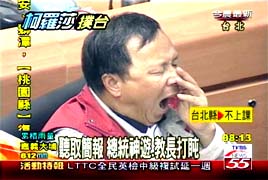
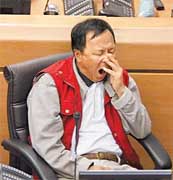
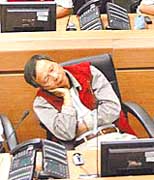
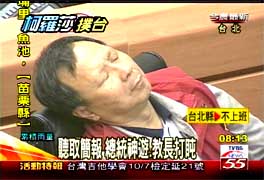
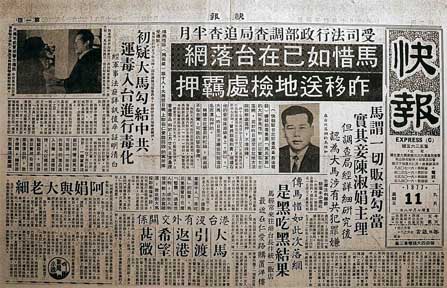
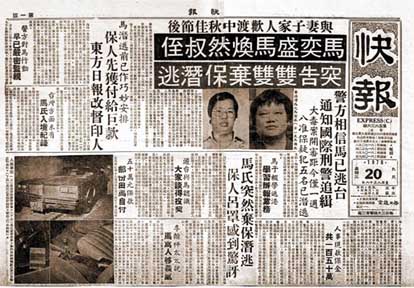
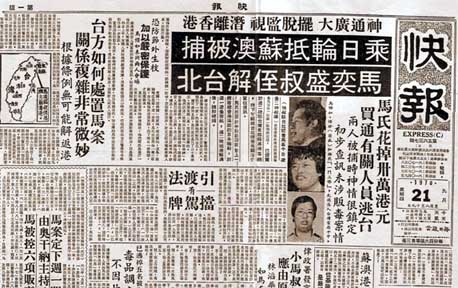
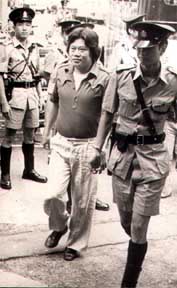
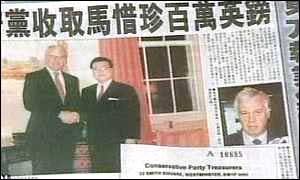
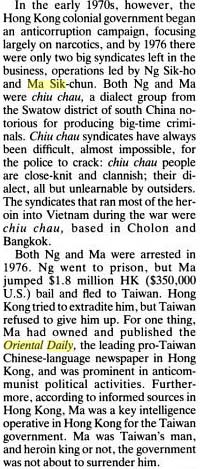
No comments:
Post a Comment
Comments always welcome!